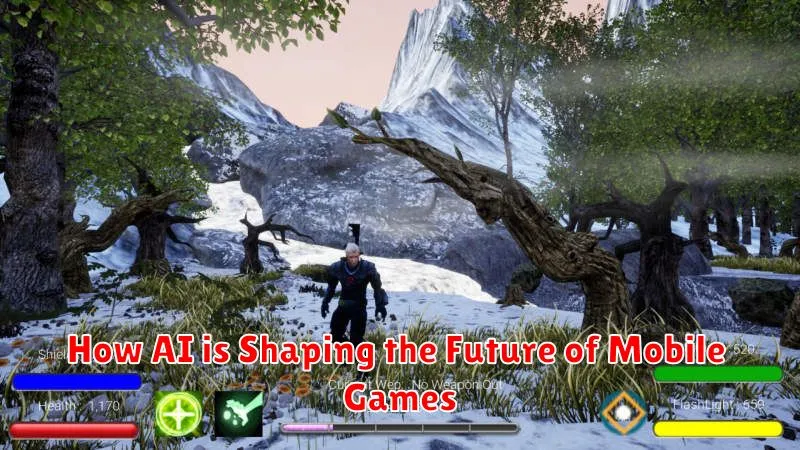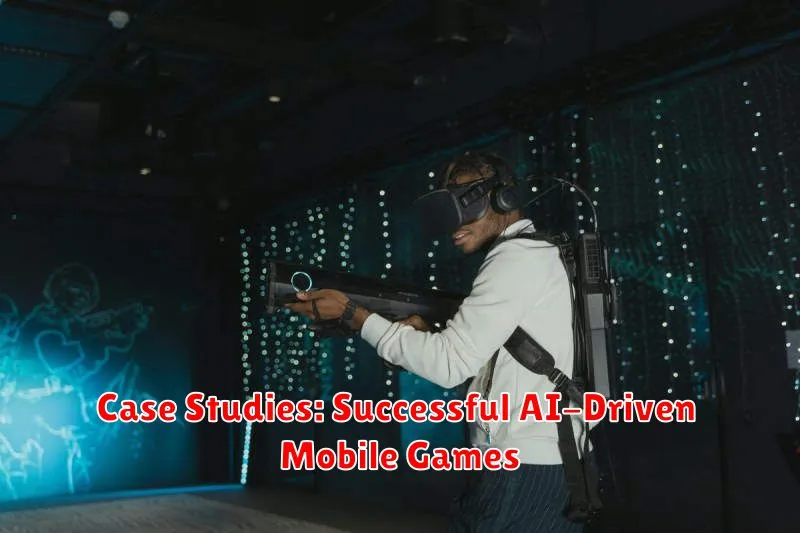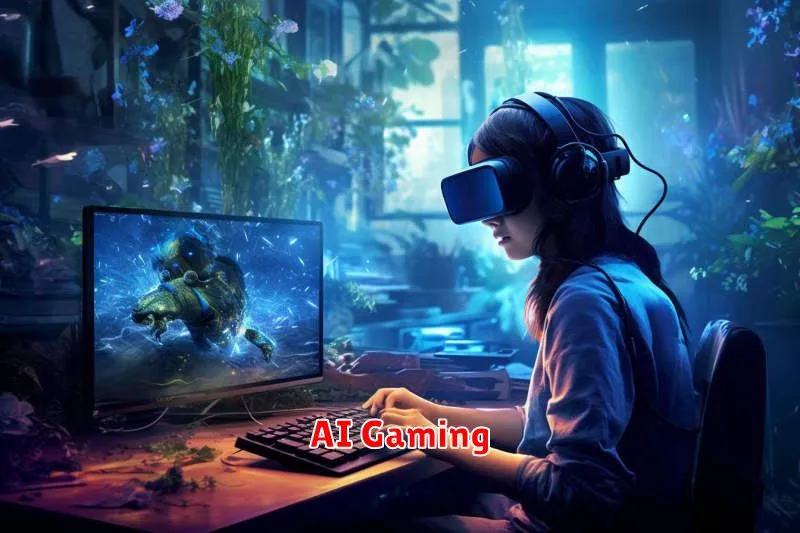The mobile gaming industry is constantly evolving, with new technologies emerging and reshaping the landscape. One of the most significant advancements in recent years has been the integration of artificial intelligence (AI). From enhancing gameplay to streamlining development processes, AI is transforming the way mobile games are designed, developed, and experienced.
This article delves into the role of AI in mobile game development, exploring the various ways it’s being utilized to create more engaging, immersive, and innovative gaming experiences. We will discuss the key applications of AI, including game design, character development, level generation, and player behavior analysis, while also exploring the potential impact of AI on the future of mobile gaming.
How AI is Shaping the Future of Mobile Games

Artificial intelligence (AI) is rapidly transforming the gaming industry, particularly in the realm of mobile games. AI’s influence extends beyond just game development, profoundly shaping the player experience and reshaping the industry’s landscape.
One of the most significant ways AI is shaping the future of mobile games is through game design. AI-powered tools are being used to create more engaging and challenging game levels, procedurally generate content, and even design entire game mechanics. This allows developers to create richer, more dynamic game experiences that cater to diverse player preferences.
AI is also revolutionizing the way mobile games are played. AI-powered NPCs (non-player characters) are becoming more sophisticated, exhibiting realistic behavior, learning from player interactions, and adapting to different playstyles. This creates a more immersive and engaging experience, blurring the line between human and artificial players.
Furthermore, AI is transforming the monetization of mobile games. AI algorithms are used to personalize in-game purchases, predict player behavior, and optimize advertising campaigns. This allows developers to tailor their monetization strategies to individual players, maximizing revenue and player satisfaction.
The integration of AI in mobile games is still in its early stages, but its impact is undeniable. As AI technologies continue to evolve, we can expect even more innovative and engaging mobile gaming experiences in the years to come.
The Role of AI in Game Design and Development
Artificial intelligence (AI) is rapidly transforming the landscape of mobile game development, playing a pivotal role in enhancing gameplay, design, and overall player experience. From crafting intelligent non-player characters (NPCs) to optimizing game balance and even generating dynamic content, AI is empowering developers to create more engaging and immersive mobile games.
One of the most significant contributions of AI lies in the creation of realistic and engaging NPCs. By employing machine learning algorithms, developers can equip NPCs with advanced behavior patterns, making them respond to player actions in a more natural and unpredictable way. This not only enhances the sense of immersion but also opens up possibilities for more dynamic and interactive gameplay.
AI also plays a crucial role in game balance. By analyzing vast amounts of player data, AI algorithms can identify areas where the game is too difficult or too easy, allowing developers to adjust game mechanics and difficulty levels in real time. This ensures a more balanced and enjoyable experience for all players, regardless of their skill level.
Furthermore, AI is enabling the development of dynamic content generation. By utilizing AI-powered tools, developers can automatically create new levels, quests, and even entire game worlds, significantly reducing development time and resources while providing a fresh and ever-evolving experience for players.
AI-Powered NPCs: Enhancing Player Experience

In the realm of mobile game development, AI-powered NPCs are transforming the way players interact with the game world. These non-player characters, driven by artificial intelligence, are no longer mere static elements but dynamic entities capable of engaging players in meaningful ways.
Traditionally, NPCs in mobile games were limited in their responses, often following pre-programmed scripts. However, AI-powered NPCs introduce a layer of dynamic interaction, allowing them to react to player choices, adapt to different scenarios, and even develop unique personalities. This enhanced realism immerses players deeper into the game world.
Beyond realism, AI-powered NPCs contribute significantly to the player experience by fostering a sense of engagement and challenge. By learning player behavior and adjusting their responses accordingly, AI-powered NPCs can provide personalized interactions, tailored to each player’s preferences and play style. This can lead to more challenging encounters, rewarding discoveries, and a greater sense of accomplishment.
One prominent example is the use of AI in dialogue systems. AI-powered NPCs can understand and respond to player prompts, creating natural and engaging conversations. This not only adds depth to the story but also allows players to influence the narrative, making them feel more invested in the game’s world.
In conclusion, AI-powered NPCs are revolutionizing mobile game development by creating more immersive, engaging, and personalized experiences for players. Their ability to react dynamically, adapt to player choices, and develop unique personalities elevates the level of interaction and sets a new standard for player engagement in mobile gaming.
Challenges in Implementing AI in Mobile Games
While AI offers exciting possibilities for mobile game development, integrating it effectively poses several challenges.
One significant hurdle is the limited processing power of mobile devices. Implementing complex AI algorithms requires substantial computational resources, which can strain device performance and lead to lag or reduced frame rates.
Another challenge lies in balancing AI difficulty. Developers must strike a delicate balance between creating challenging and engaging AI opponents while ensuring the gameplay remains enjoyable for players of all skill levels.
Furthermore, ensuring AI fairness and predictability is crucial. Players expect AI opponents to behave consistently and predictably, making the game feel fair and rewarding. Inconsistent AI behavior can lead to frustration and dissatisfaction.
Finally, optimization for diverse mobile devices is essential. Different devices have varying processing capabilities and memory constraints, necessitating careful optimization to ensure smooth performance across a wide range of devices.
The Future of AI in Mobile Gaming
The integration of Artificial Intelligence (AI) in mobile gaming is rapidly changing the landscape of the industry. AI is already being used in a variety of ways to enhance the gaming experience, from creating more realistic and engaging characters to optimizing game design and personalizing gameplay.
One of the most exciting areas of AI development in mobile gaming is the creation of non-player characters (NPCs) that are more intelligent and lifelike. AI can be used to create NPCs that can learn and adapt to player behavior, making them more believable and challenging opponents.
Another promising application of AI is in the area of game design. AI can be used to analyze player data and identify patterns that can be used to improve game design. For example, AI can be used to optimize game difficulty, identify areas where players are struggling, and suggest ways to improve the overall user experience.
AI also has the potential to revolutionize the way mobile games are personalized. AI-powered systems can be used to tailor the gameplay experience to individual players’ preferences, providing them with a more engaging and satisfying experience. This can be done by recommending specific levels or challenges, adjusting the difficulty level, and even suggesting new games that players might enjoy.
The future of AI in mobile gaming is bright. As AI technology continues to develop, we can expect to see even more innovative and immersive gaming experiences.
Case Studies: Successful AI-Driven Mobile Games

AI is increasingly being used in mobile game development to create more engaging and immersive experiences. By leveraging AI, developers can generate procedurally generated content, personalize gameplay, and optimize game balance.
Here are some case studies of successful AI-driven mobile games:
No Man’s Sky
This open-world exploration game utilizes AI to generate vast procedurally generated planets and ecosystems. The AI creates unique landscapes, flora, fauna, and even alien civilizations, offering players an endless amount of exploration possibilities.
Mario Kart Tour
The AI in Mario Kart Tour plays a crucial role in creating challenging and dynamic races. It analyzes player skill levels and adjusts the difficulty of opponents to ensure a balanced and enjoyable experience.
PUBG Mobile
PUBG Mobile’s AI-powered matchmaking system ensures that players are matched with opponents of similar skill levels, fostering fair competition and a balanced gaming environment.
These examples showcase how AI can revolutionize mobile game development. By integrating AI, developers can create more engaging, personalized, and immersive experiences for players, ultimately contributing to the success of their games.

